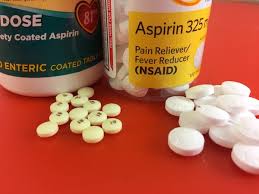Aspirin is a salicylate and a nonsteroidal anti-inflammatory drug (NSAID). It is taken by humans to prevent heart attacks and stroke. It is also used to reduce fever and relieve mild to moderate pain from conditions such as muscle aches, toothaches, common cold, and headaches. It may also be used to reduce pain and swelling in conditions such as arthritis. But do you know that plants can also benefit from aspirin? Scientists have found out that aspirin can help plants to:
1. fight off diseases (fungal, bacterial and viral)
2. tolerate stress conditions (salty soils, high temperature, drought, cold) [1] and
3. improve plant growth.
Aspirin contains Acetyl Salicylic Acid (ASA), which can change to salicylic acid (SA) when it dissolves in water. Salicylic acid is present in fruits and vegetables, with more in herbs and spices. Interestingly, scientists have also discovered that aspirin and a diet rich in fruits and vegetables help prevent cancer of the colon, rectum etc in humans [2]. But taking aspirin for a long time can be very risky health wise [3].
Aspirin Spray for Plants
You can spray your plants with aspirin to get the benefits listed above. Any brand of aspirin will work, but plain, uncoated tablets dissolve best.
Recommended dose is 250-500mg of aspirin (about 1-2 regular aspirin tablets) in 4.5l of water. Spray the plants 2-3 times per month for best result. Spraying should be done before you spot the disease. This is because what aspirin does is to make the plants set up early defences against diseases, even before they strike. This readiness will help the plants fight better. Adding a little liquid soap and oil will help the solution stick to plants’ leaves.
Aspirin Soil Drench
Watering plants with aspirin solution can help improve growth, immunity and tolerance to stress conditions like drought, heat and chill. The aspirin dose to use may vary from plant to plant. One research on beans and tomatoes [1] used 0.1–0.5 mM (mili Molarity) ASA or SA with good result. This is equivalent to 18.0158 to 90.079mg ASA per liter water. For a tablet that contains 300mg ASA, this translate to dissolving 1 tablet in 16.7L or 3.33L of water (i.e. 300÷18.0158 = 16.7L or 300÷90.079 = 3.33L)
Aspirin for Root Nematode Control
In one research on sugar beets [7], it was found that aspirin as either foliar spray or soil drench controlled root knot nematode. But the dosage matters. For foliar spray, ASA at 100 ppm (parts per million) was better than 1000 ppm.
100 ppm = 100mg ASA per liter water [One 300mg tablet in 3L water].
1000ppm = 1000mg ASA per liter [Three point three 300mg tablets per liter water or 4 tablets in 1.2L water]
As soil drench, 1000ppm was better than 100 ppm.
Aspirin Seed Soak
You have to be very careful here. Since using too much aspirin will lead to VERY poor germination and growth. In one research [4], cucumber seeds were soaked in aspirin solution for 5 hours. Then, they were placed between 2 filter papers wetted with aspirin solution and left for 48 hours. They found out that ASA concentration above 0.00001M (1.802mg ASA per liter water) had bad effect on germination and growth. Notice the very little amount of aspirin used. Let me put it in perspective. I have Kunimed Aspirin tablets and each tablet contains 300mg of acetylsalicylic acid (ASA). Using 1.802mg ASA per liter water means that I will have to dissolve 1 tablet in 300mg/1.802mg = 166.5L of water. 1 tablet in 166.6L of water!
I had once soaked Cameroun pepper seeds in aspirin solution. I didn’t remember the exact concentration I used, but it was quite high, like 1 tablet in few liters of water. Out of the 100s of seeds I soaked, fewer than 5 germinated. But thank God I did not soaked all the seeds I bought. The unsoaked seeds all germinated well. For now, I won’t recommend soaking seeds in aspirin solution, I will stick with foliar spray and root drenching to get the same benefits.
Note that the dose of aspirin that seeds can tolerate depends on the seeds. Beans and tomato can be soaked in 0.1–0.5 mM (mili Molarity) ASA or SA with good result. This is equivalent to dissolving 1 tablet (300mg) in 16.7L or 3.33L of water.
Finally, do you want your plants to grow better, resist diseases better and tolerate harsh growing consitions better? Then spray them or water them with the right dose of aspirin solution.
References
3. mdanderson.org/publications/focused-on-health/low-dose-aspirin-cancer-prevention.h20-1589046.html
4. scialert.net
8. Inhibitory effects of salicylic acid on Meloidogyne javanica reproduction in tomato plants.

Sir/Madam i would like to join to know more about farming
You are welcome. Join our forum and ask your questions. Forum is here: farmersjoint.com.
[…] How to Reduce Pest Attacks on Crops with Aspirin […]